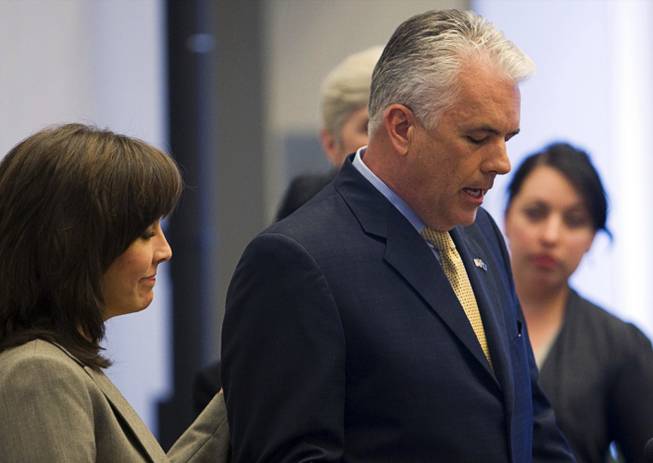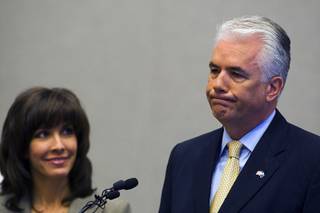
Sen. John Ensign announces he will not seek another term in 2012 during a news conference at the Lloyd George Federal Building in Las Vegas on Monday, March 7, 2011. Ensign’s wife, Darlene, stands by him at left.
Sunday, April 24, 2011 | 2 a.m.
Sun archives
- Until the end, Ensign a master of close-call politics (4-22-2011)
- Heller appointment to Senate changes campaign calculus (4-22-2011)
- Dean Heller could get boost, but can't shake bout with Shelley Berkley (4-22-2011)
- If Dean Heller chosen to replace John Ensign, fallout would be felt down the ticket (4-22-2011)
- Sandoval: Sen. John Ensign replacement will be named before May 3 (4-22-2011)
- Nevada’s special election laws not so clear, probably will result in lawsuit (4-22-2011)
- Sen. John Ensign to resign, Dean Heller likely replacement (4-21-2011)
Resignation Letter
Ensign Timeline
Sun Coverage
When John Ensign was making his first bid to be a senator, another public figure in Washington — the president at the time — was in political cross hairs for an affair he had with a staffer named Monica Lewinsky.
The end of Bill Clinton’s term as a public servant in Washington was consumed in a barrage of impeachment proceedings, accusations that he’d abused his office, and a chorus of calls for him to resign, in which the future Nevada Sen. Ensign joined, saying: “He has no credibility left.”
Clinton’s political legacy would be forever tarnished by his affair, but it wouldn’t be entirely defined by it; nor would it bring about the end of his career the way Ensign’s episode of infidelity did almost 13 years later.
There are those who talk of Ensign’s fall from political grace, and the resignation that takes effect a week from Tuesday, with a hint of pleasure at the irony of the situation, brought about by the hypocrisy of his actions. There are others who will defend him as the consummate objective moralist, who when confronted with his own faults, heeded his own advice.
Ensign may not belong at either end of that ethical spectrum. Because the pendulum of Ensign’s moral purism, it seems, swings both ways.
Ensign certainly fell on the sword of family values — morals he’d spent much of his career espousing as absolute, and portraying himself as embodying.
But Ensign also voluntarily departed from the dogmatism of the values-conservative position more often than most, especially in the wake of his scandal.
In the past few months, we’ve seen Ensign, who’s been no friend to the gay rights agenda, break from his party to support a repeal of the military’s “don’t ask, don’t tell” policy — a departure only eight Republican senators made.
We’ve also seen the anti-abortion Ensign scold members of his party for holding up budget negotiations over a disagreement on funding for Planned Parenthood, which the GOP objected to because it performs abortions.
To be sure, his softened, pragmatic approach to such social issues came late in the wake of the fallout from his own ethical scandal that inspired three investigations — the last of which, by the Senate Ethics Committee, is still technically ongoing.
His affair was just one in a stream of extramarital revelations that seemed to pour out of the C Street house a few years ago; that being where a band of politically conservative brothers lived and prayed together just off the Capitol campus. But even in a sea of salacious scandals involving such things as high-class prostitutes and junkets to South America, there was something extra uncomfortable about Ensign’s story, which at its core was a tale of the senator betraying his best friend.
It’s hard to think of someone who does that as having been anything but the most flawed type of moral crusader, who in the end, learned a bit of humility from his own mistakes. Or maybe it’s just that the senator was always more of a pragmatist than he let on.
Even as he resigned, Ensign wasn’t apologizing, or conceding that his credibility was to blame. He appeared to be simply taking stock of the Senate ethics investigation, and heeding a different bit of his own more recent advice to others. It was on the Senate floor this month where he urged the GOP not to hang the budget up on funding for Planned Parenthood (even though he would later vote to defund Planned Parenthood and against the budget deal, for other reasons).
“We have to look at what we can do, what is achievable,” he said then.
There, Ensign apparently felt, as a senator under scrutiny, he’d reached the end of his ability to achieve.


Join the Discussion:
Check this out for a full explanation of our conversion to the LiveFyre commenting system and instructions on how to sign up for an account.
Full comments policy